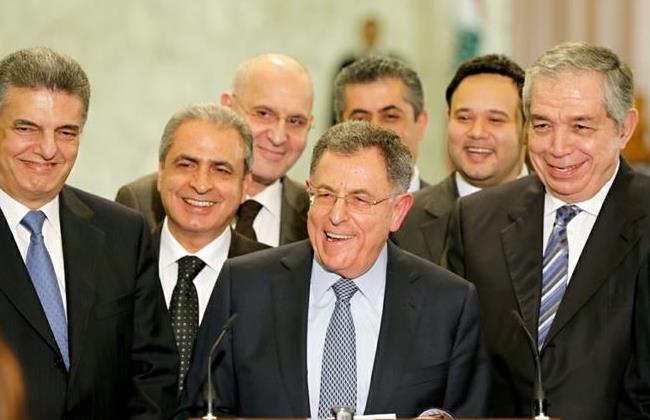Future Bloc urges FPM, Hezbollah to end boycott
Hussein Dakroub/The Daily Star/Dec. 31, 2014
BEIRUT: The parliamentary Future bloc implicitly called Tuesday on MP Michel Aoun’s Free Patriotic Movement and Hezbollah to end their boycott so that Parliament can convene to elect a president and overcome the 7-month-old “dangerous presidential vacuum.”
The bloc also defended its dialogue with Hezbollah, stressing it should be accompanied by “practical steps” to reduce sectarian tensions in the country and restore the state’s role in extending its authority and sovereignty over all Lebanese territory.
Speaker Nabih Berri, meanwhile, said the Future-Hezbollah dialogue was aimed, among other things, at creating “a fertile ground” to benefit from any regional understanding, in a clear reference to a possible Saudi-Iranian rapprochement that would reflect positively on the presidential deadlock.
In New Year greetings to the Lebanese, the Future bloc hoped that 2015 would carry with it “different developments” that would help overcome the current crisis that has left Lebanon without a president for more than seven months, paralyzed Parliament legislation and is threatening to impede the government’s work.
“The bloc hopes that the obstructers [of the presidential vote] will act to enable the Lebanese Parliament to elect a new president for the country in order to overcome the dangerous and harmful presidential vacuum and restore balance to Lebanese constitutional institutions,” the bloc said in a statement after its weekly meeting chaired by former Prime Minister Fouad Siniora.
The statement was apparently referring to lawmakers from Aoun’s bloc and Hezbollah’s bloc and its March 8 allies who have been blamed for thwarting a quorum for Parliament electoral sessions with their consistent boycott. They have demanded an agreement beforehand with their March 14 rivals on a consensus candidate for the presidency.Parliament has repeatedly failed since April due to a lack of quorum to pick a successor to former President Michel Sleiman, whose six-year term ended on May 25.
The bloc’s statement came a day after Berri called for a new Parliament session to elect a president on Jan. 7 amid signs that the session was destined to fail like the previous 17 abortive attempts as the rival March 8 and March 14 parties remain at odds over who should be a consensus candidate to fill the country’s top Christian post.
Prime Minister Tammam Salam as well as Future MPs and rival politicians have voiced hopes that the first dialogue session that kicked off last week between senior officials from the Future Movement and Hezbollah would help break the presidential stalemate.
A second round of talks between the two rival influential parties is expected to be held on Jan. 5 at Berri’s residence in Ain al-Tineh.
Referring to the talks with Hezbollah, the bloc said: “The dialogue should be accompanied by practical steps on the ground that would end all breaches against sanctity of the law, state sovereignty and citizens’ dignity and boost confidence among the Lebanese.”
“These steps should stress the need for stability and adherence to coexistence in the country in a way that would help strengthen the state authority and its institutions and enable it to spread its sovereignty and authority over all Lebanese soil,” the statement said.
Stressing that dialogue was the only way to resolve outstanding problems between the rival Lebanese factions, the bloc hoped that talks with Hezbollah would produce “practical steps” to reduce sectarian tensions in the country exacerbated by the war in Syria.
“The need has become urgent to restore security and stability in Lebanon on the basis of respecting the state and boosting its sovereignty,” it added.
Berri, the sponsor of the Future-Hezbollah talks, said the second dialogue session would be held at the beginning of the New Year with one specific item agreed by the two sides in the agenda. He did not disclose details of this item.
“Some have propagated that the Hezbollah-Future dialogue is an indirect dialogue between the Kingdom of Saudi Arabia and the Islamic Republic of Iran,” Berri was quoted by visitors as saying.
“If this was interpreted as such, that’s fine. I don’t deny this accusation, even though I do not represent the two countries in my dialogue initiative, but I was driven in the first place by internal Lebanese considerations,” he added.
Berri, according to visitors, voiced satisfaction with the local and foreign reactions to the Future-Hezbollah talks, saying he had received a message of support for this dialogue from the Egyptian Foreign Ministry, in addition to “positive stances” expressed by the U.S., Saudi and Iranian ambassadors in Beirut.
The speaker said among the goals of the dialogue was to set the stage for “a fertile ground” to benefit from any possible deal by regional powers.
“The U.S.-Iranian dialogue would eventually lead to results. This would reflect positively on the issue of Saudi-Iranian relations once Riyadh has been given necessary assurances,” he said.
“The Hezbollah-Future dialogue constituted an incentive for the Maronites to launch a dialogue between them,” Berri said, referring to attempts to arrange a rare meeting between the two Maronite rivals, Aoun and Lebanese Forces chief Samir Geagea.
For his part, Saudi Ambassador Ali Awad Asiri said unity among rival Christian parties would help end the presidential impasse within two months. “Once the Christians are united and if an honest political will exists, all matters [over the presidential crisis] will be solved,” Asiri told MTV station.






















